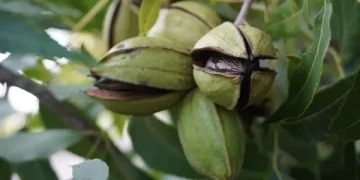Pecans are the only major tree nut that is actually native to the United States. In fact, the word “pecan” is derived from a Native American word of Algonquin origin meaning “a nut that is very difficult to break by hand.” With 10 milligrams per ounce, pecans contain more phytonutrients, especially flavonoids, than some superfruits.
Today, consumers are becoming increasingly interested in the origin, production, and quality of their foods, which in turn affects how products are evaluated and priced. American pecans meet growing demand because they have a strong heritage with the qualities of a future superfood.
“Pecans are one of the few indigenous plants to have grown into a highly coveted and internationally traded crop, with American growers producing more than 80% of the world’s pecan supply.” – American Pecan Council.
Nuts Native to Texas
According to the American Pecan Council, the United States produces more than 300 million pounds of pecans annually. Pecans are grown primarily in 15 US states, with a native range stretching from Texas to southwestern Ohio and parts of Kentucky and Alabama.
The widespread growth of pecans in the Americas can be traced back to Native American peoples, such as the Karankawa, who collected the kernels during the fall months, traded the nuts between the nations, and relied on these nuts as a food source. Because they moved with Central Texas. rivers. Texas pecans were first introduced to the wider world. According to the book Pecans: America’s Native Nut Tree, Spanish conquistador Cabeza de Veca was the first European to encounter pecans after a ship-wreck near Galveston in 1528.
Today, pecans are a native agricultural resource in more than 150 of the 254 Texas counties. In fact, Texas consistently ranks among the top three pecan-producing states—harvesting an average annual crop of nearly 60 million pounds. An impressive number considering that many pecans come from families that have passed down the traditions of the trade over many generations.
Food Trends and the Future of Pecans
With plant-based and plant-forward diets gaining traction, pecans are sure to make a big presence in everyday diets. Packed with numerous health-promoting nutrients and bioactive compounds, pecans are a true nutritional powerhouse. They are a valuable plant protein source that are cholesterol free, gluten free and naturally sodium free. Next to their nutritional value, pecans are super versatile, pairing with a wide range of flavors and adding well to a variety of culinary creations.
“From a culinary standpoint, pecans have a taste and texture unlike any other nut, which gives them many applications and the ability to shine in both professional (cooks and food manufacturers) and consumer kitchens.” –Diane Welland, MS, RD, communications manager for the National Pecan Shellers Association.
On their own, pecans are known for their naturally sweet and rich, buttery flavor.

Like most nuts, they are available shelled and unshelled. When delivered, Texas pecans are usually shelled, allowing them to be enjoyed directly by consumers once they are purchased. It is worth noting, that the pecan industry is seeing some growth and there is a demand for pecan based products, such as pecan butter, flour, oil and milk. These products are particularly relevant to consumers who are looking for plant-based alternatives or those with certain dietary restrictions, such as those with gluten intolerance. Pecans can be taken in many different forms and can easily be added to any part of the diet. Salty, sweet, crunchy, buttery or smooth, pecans are great for traditional dishes and everyday meals as well as innovative dishes.
Packed with tons of health benefits, Texas pecans have been described as a superfood. Walnuts native to America not only have nutritional value and beloved flavor, but also a storied history that shaped the pecans of today. Through its strong roots and generations of growers, the Texas pecan is not only a staple in the South, but a valuable nut enjoyed around the world.
Are you an importer or business looking for Texas Pecans in Europe? Feel free to contact Faf Export Marketing, European In-Market Consultant for Texas Department of Agriculture.
for more information:
faff
Tel: +31(0)36 760 7100
E-mail: pem@phaff.com
A source: https://darik.news































